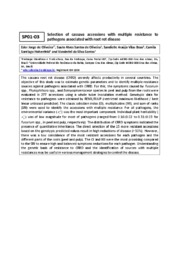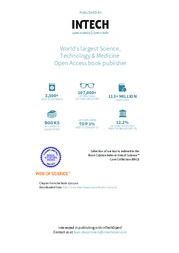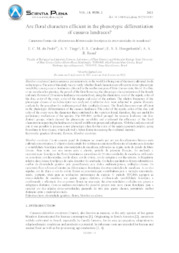Search Publications
Filter by:
| Author(s): FUKUDA, W. M. G.; SANTOS, V. da S. The cassava plant is native to Brazil, where have already been catalogued more than 4000 accessions. This wide genetic diversity has been kept in working collections and in active germplasm banks spre... ... |
| Current status and utilization of the wild cassava germplasm at Embrapa Cassava and Tropical Fruits. Author(s): ALVES, A. A. C.; LEDO, C. A. da S.; COSTA, I. R. S.; MENDES, R.; CARVALHO, P.; SILVA, A. F. Within Manihot gender, with around 98 documented species, only one is the cultivated cassava (M. esculenta Crantz), considered one of the most important staple foods in the human diet in the tropics.... ... |
| Author(s): XAVIER, C. A. D.; NOGUEIRA, A. M.; BELLO, V. H.; WATANABE, L. F. M.; BARBOSA, T. M. C.; ALVES JÚNIOR, M.; BARBOSA, L.; BESERRA-JÚNIOR, J. E. A.; BOARI, A. de J.; CALEGARIO, R.; GORAYEB, E. S.; HONORATO JÚNIOR, J.; KOCH, G.; LIMA, G. S. de A.; LOPES, C.; MELLO, R. N. de; PANTOJA, K.; SILVA, F. N.; RAMOS SOBRINHO, R.; SANTANA, E. N.; SILVA, J. W. P. da; KRAUSE-SAKATE, R.; ZERBINI, F. M. Background. The necessity of a competent vector for transmission is a primary ecological factor driving the host range expansion of plant arthropod-borne viruses, with vectors playing an essential rol... ... |
| Author(s): ARAÚJO, F. das C. B. de; CUNHA, E. F. M.; CUNHA, R. L.; FARIAS NETO, J. T. de; SILVA, R. de S. 'Bitter' and 'sweet' cassava are normally distinguished based on the hydrocyanic acid (HCN) content of their roots. Moreover, Brazilian farmers tend to select 'sweet' cassava based on the taste and co... ... |
| Author(s): NORONHA, A. C. da S.; BLANCO, D. G. B.; COSTA, V. A.; SILVA, R. B. Q. da; ARAÚJO, D. G. de; JOHNSON, N. F. The aim of this study was to assess the occurrence and identify the egg-parasitoid species of the cassava hornworm (Erinnyis spp.) in cassava plants (Manihot esculenta Crantz - Euphorbiaceae), facilit... ... |
| Author(s): OLIVEIRA, E. J. de; OLIVEIRA, S. A. S. de; VILAS BOAS, S. A.; HOHENFELD, C. S.; SANTOS, V. da S. The cassava root rot disease (CRRD) severely affects productivity in several countries. The objective of this study was to estimate genetic parameters and to identify multiple resistance sources again... ... |
| Author(s): CARVALHO, L. J. C. B.; ANDERSON, J. V.; CHEN, S.; MBA, C.; DOGRAMACI, M.
|
| Author(s): PEDRI, E. C. M. de; TIAGO, A. V.; CARDOSO, E. dos S.; HOOGERHEIDE, E. S. S.; ROSSI, A. A. B. Abstract: Manihot esculenta Crantz assumes a prominent role in the world for being one of the most cultivated foods in the tropics. The aim of this study was to verify whether floral characters are ef... ... |
| Author(s): OLIVEIRA, S. A. S. de; SANTOS, V. da S.; OLIVEIRA, E. J. de Among the several pathogens of cassava (Manihot esculenta Crantz), the Passalora spp. complex is by far the most frequent worldwide. Three different diseases make up this complex: blight leaf spot (BI... ... |
| Author(s): GONZALEZ, C.; PÉREZ, S.; CARDOSO, C. E. L.; ANDRADE, R.; JOHNSON, N. In 2006, Embrapa, supported by the HarvestPlus Program and CIAT released four yellow varieties with improved levels of provitamin A: BRS Dourada, BRS Gema de Ovo, Amarelo I and Amarelo II. For the dif... ... |
Observation
Some of Embrapa's publications are published as ePub files. To read them, use or download one of the following free software options to your computer or mobile device. Android: Google Play Books; IOS: iBooks; Windows and Linux: Calibre.
Access other publications
Access the Agricultural Research Database (BDPA) to consult Embrapa's full library collection and records.
Visit Embrapa Bookstore to purchase books and other publications sold by Embrapa.






